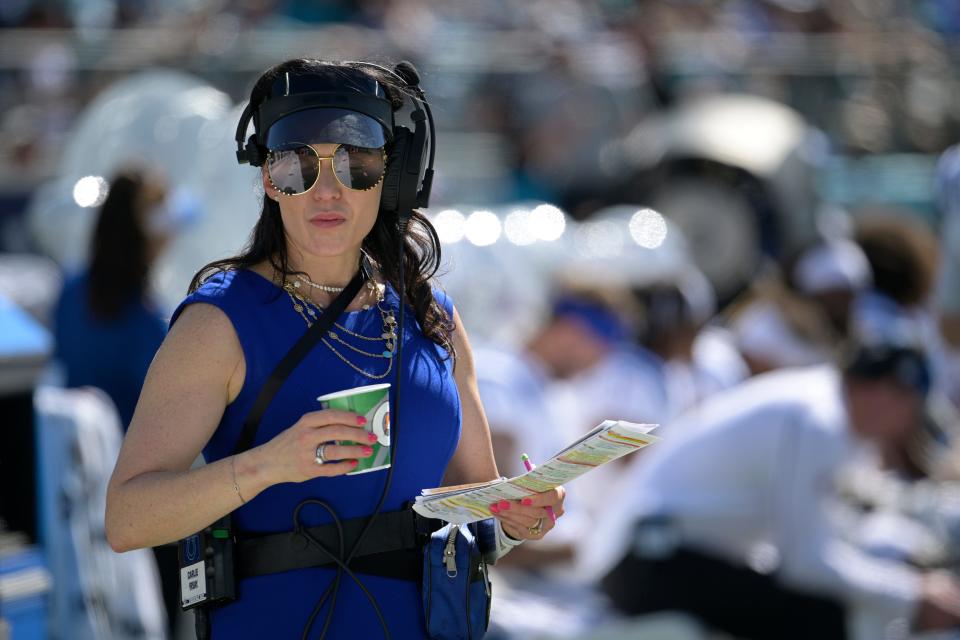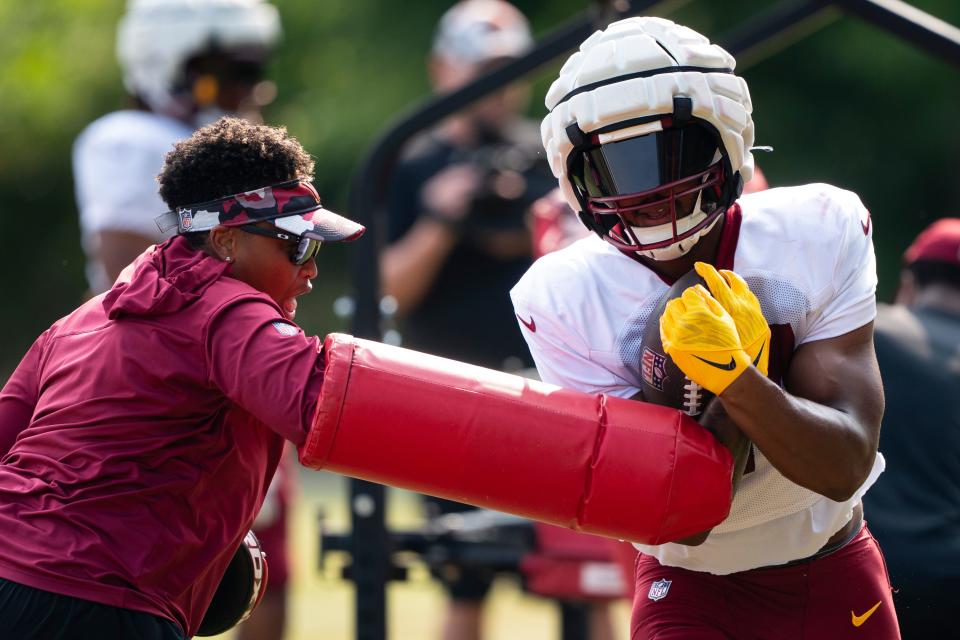There is no clear path for women who want to be NFL coaches. Can new pipelines change that?
An incoming call from a phone number Isabel Diaz did not recognize appeared on her phone and, without thinking about it much, she answered. The voice on the other line belonged to Gus Bradley, defensive coordinator for the Indianapolis Colts.
The call wasn’t completely out of the blue. Diaz had been speaking with members of the organization since the 2023 Women’s Careers in Football Forum at the NFL Combine in Indianapolis because she applied for the organization’s full-season fellowship named after former coach Tony Dungy and awarded to a diverse coaching candidate.
Bradley scheduled a Zoom conversation with her for the next night. Soon after, Diaz was on her way from Stillwater, Oklahoma, where she was finishing her time at Oklahoma State University, to Indianapolis for in-person interviews with the staff.
“It all happened super fast,” she told USA TODAY Sports by phone during training camp.
“I was hoping (the Colts) would love me as much as I love them,” Diaz, 22, added. “Sure enough, here I am.”
The Colts loved her so much they created a new fellowship for her instead. Diaz is working this season through the organization’s inaugural Harriet P. Irsay Coaching Fellowship. Carlie Irsay-Gordon, daughter of team owner Jim Irsay, spearheaded the idea. Having grown up in the organization, Irsay-Gordon theorized that because women have not played the game of tackle football professionally, they are directed away from teaching and coaching jobs at that level and below.
“When women are shifted away from a coaching career early on, the process of learning to become a football coach is stunted,” Irsay-Gordon wrote to USA TODAY Sports. “There is no college degree in coaching football. The only avenue for women to become coaches comes from other coaches that have already developed into NFL coaches. So, if women have more of a learning curve than the average entry level quality control coach, how does our organization overcome that?”

Ahead of the 2023 NFL season, the league touted the number of female full-time assistant coaches (10) as its most ever. But according to USA TODAY Sports’ NFL Coaches database, those gains have primarily been made in the strength and conditioning space. The number of women coaches with defined on-field roles has not grown significantly since 2015, when Jen Welter became a training camp intern with the Arizona Cardinals. By 2018, there were three full-time women with on-field coaching responsibilities. That number grew to four the next year and has stayed there, except for a drop to three again in 2021.
The first group of women to patrol NFL sidelines — who didn’t have systems in place to best prepare for life in the league — say the foundation they helped build has already paid off with coaches like Diaz and other young women in the pipeline. But there's still a long way to go.
Eight years after Welter made history, a woman has yet to lead her own “room" as a position coach without the "assistant" title. That is despite existing efforts, such as the Women’s Forum, and a network of coaches aimed at increasing the number of women in the coaching ranks and elevating them through the professional ladder.
“The women who secured jobs in the early days of the program are now sending the elevator down and bringing in more women to their clubs, especially at the internship level,” said Sam Rapoport, NFL executive vice president for diversity, equity and inclusion.
Diaz was an impressionable high schooler when the NFL hired its first women coaches, and she drew inspiration from that wave, which included Welter, Jennifer King (assistant running backs coach, Washington Commanders) and Lori Locust (defensive quality control, Tennessee Titans).
"I’ve wanted to coach football since I was young," Diaz said. "And so, I’ve followed the women coaches and followed the progress we made."
More progress awaits.
“Our pipeline for coaching is still not what it should be for us to create that ubiquity and normalization of women in football,” Rapoport said, “so that really is the next step.”
NFL coaching ‘the hardest nut to crack’
Gender equity in the coaching realm paces behind strides women have made in other departments, such as scouting and front office personnel. According to Rapoport, roughly 70 women are employed in scouting roles of the 223 women (including coaches) who work in football operations.
“Without question, it's the hardest nut to crack,” Rapoport told USA TODAY Sports.
Locust — who started her football coaching career by attending football clinics in Virginia and then driving through the night to her home in Pennsylvania — finding a new job this offseason after losing her previous one as the assistant defensive line coach with the Tampa Bay Buccaneers is a sign of change.
“I think it speaks to the normalization of women coaching,” Rapoport said.
The door for women coaches is “cracked a little bit now,” King said. “It’s not super new anymore, or out of this world.”
And since the Women's Forum is an annual event, Locust and King are hoping to help install a development track for women coaches that can exist year-round and provide the coaches with deliverable skills, such as Microsoft Visio.
“So you attend the forum, it’s great, you’re wonderful. Maybe you get an internship. Then what?” Locust said. “That’s where we’re wanting to say there has to be something formal, there has to be something tangible as far as training track.”
No one at the first forums King and Locust attended already had a job in football, King said. In fact, they were juggling full-time gigs on top of pursuing their dreams. Today, participants are employed at the high school or collegiate levels, or in another professional league such as the USFL/XFL.
“That’s the cool thing about the new generation, is that they're all so young,” said King, who at 37 became the first Black woman to coach full-time with an NFL team when she was promoted to assistant running backs coach in 2021.
Stuck in the pipeline: 'Positional segregation' is rampant in the NFL, leaving Black coaches stagnant

The forum remains a place for networking. It’s where Diaz met Irsay-Gordon and John Park, who was then the Indianapolis Colts’ director of football research (he is now the director of strategic football operations with the Dallas Cowboys) and encouraged her to apply for the Dungy Fellowship, which is designated for diverse candidates.
Irsay-Gordon said she met with the coaching staff and reviewed the job description for the Dungy Fellowship ahead of the program's second season. She discovered there were “key differences in the barriers for women versus male candidates of color.” She thought lack of on-field experience in the sport played a role in the team not selecting a woman despite interviewing many candidates. The Harriet P. Irsay Fellowship was formed.
When the Colts hired Shane Steichen as their head coach this offseason, according to Irsay-Gordon, a component of that process was making sure he would assemble a staff that wanted to mentor and develop a woman coach.
“In hiring Izzy, I wanted to make sure this would be a REAL coaching fellowship,” Irsay-Gordon wrote, “and not a position to check a box.
"We had to make sure the coaches responsible for mentoring and training had the time, motivation, and expertise to provide a quality apprenticeship for the candidate."
Furthermore, Diaz is making her own history as the youngest Latina coach to have a full-season, on-field coaching role with a team.
“That means a lot to me, and it’s something that I’m happy to represent and show that is possible to do this, being a Latina,” said Diaz, whose father is Puerto Rican. “To show that community that it’s possible and that you can do it is something that I’m proud of.”
A playbook to follow
Diaz knew as a young child she wanted to coach football, ever since she and her grandfather, Ray Hopkins, would start their Sundays with coffee and donuts and watch the entire NFL slate through “Sunday Night Football.”
But it wasn’t until 2015, when she was a freshman in high school, that she realized women actually were coaching at the highest level. Prior to that, Diaz said, she didn’t have “a playbook to go by.”
“To see these women take that path and then creating this playbook, it helped me kind of go, 'Let me get experience. Let me get into meetings,’ ”she said.
Diaz became a student assistant on Mike Gundy’s defensive staff with the Oklahoma State Cowboys, which helped set her apart during the all-day interview process with the Colts. Diaz met with coaches on both sides of the ball, but connected with special teams.
“Very organized, very detailed, very sharp,” special teams coordinator Brian Mason told USA TODAY Sports about what he remembered from his first interaction with Diaz. “We kind of created a position for her just with the special teams after that interaction.”
Having knowledge of how to do game breakdowns, compile scouting reports and prepare for both practice and game weeks impressed the staff, Mason said. Once Diaz graduated from Oklahoma State, she joined the team during OTAs.
“It’s not easy to be a woman in sports, especially football, especially when you’re talking about being a football coach,” Mason said. “There’s probably people who have a stigma about that or have stereotypes about that, but really, she has exceeded all expectations for everyone and anyone and really earned her role and done a great job.”
Mason and assistant special teams coach Joe Hastings slowly began onboarding her, and Diaz developed into a “huge asset” for the special teams unit, Mason said. She can assist with coaching the scout team and draw up the proper practice cards.
“All the off-field, office-type stuff is what she’s doing here,” Mason said. “She had a really good foundation on how to get all that work done and really hit the ground running.”
Diaz is learning on the fly when it comes to coaching special teams and technique. She took the time to learn how to fill out kicking and punting charts, how they time the snap-hold-kick operation and other details.
“I’m a sponge,” Diaz said. “I’m ready to absorb it all.”
King and Diaz worked together with the Commanders in 2022 during the latter's stint as a Bill Walsh Diversity Coaching Fellow, a program that runs from OTAs through training camp. Being on the same staff as King for even a few months was a “wow” moment for Diaz.
“It was amazing to have someone I’ve looked up to for so long now present right there, and be on the same staff and learn from her and being able to ask her questions,” she said.
King was one of the first people to reach out and congratulate Diaz on her latest gig.
“It was something that, for me, I just don’t think I’ll ever get over — that I am in the NFL pursuing my dream and that I’m able to work with women that I’ve followed for so long,” Diaz said.
This article originally appeared on USA TODAY: New pipelines help clear the way for women wanting to be NFL coaches

